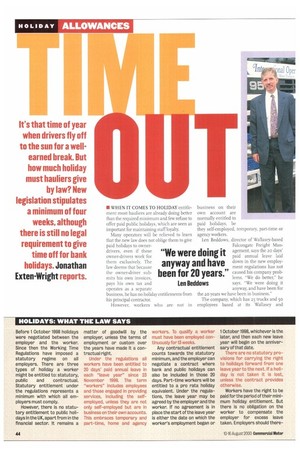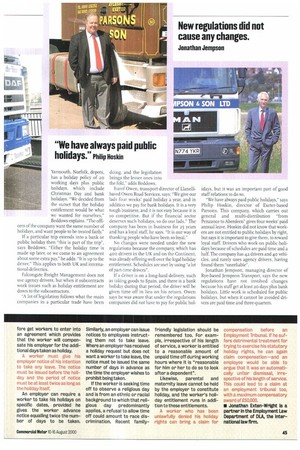It's that time of year when drivers fly off to
Page 46

Page 47

If you've noticed an error in this article please click here to report it so we can fix it.
the sun for a wellearned break. But how much holiday must hauliers give by law? New legislation stipulates a minimum of four weeks, although there is still no legal requirement to give time off for bank holidays. Jonathan Exten-Wright reports.
• WHEN IT COMES TO HOLIDAY entitlement most hauliers are already doing better than the required minimum and few refuse to offer paid public holidays, which are seen as important for maintaining staff loyal ty.
Many operators will be relieved to learn that the new law does not oblige them to give paid holidays to ownerdrivers, even if these owner-drivers work for them exclusively. The law deems that because the owner-driver submits his own invoices, pays his own tax and operates as a separate business, he has no holiday entitlements from his principal contractor.
However, workers who are not in business on their own account are normally entitled to paid holidays, be they self-employed, temporary, part-time or agency workers.
Len Beddows, director of Wallasey-based Falcongate Freight Management, says the 20 days' paid annual leave laid down in the new employment regulations has not caused his company problems. "We do better," he says. "We were doing it anyway, and have been for the 20 years we have been in business."
The company, which has 25 trucks and 50 employees based at its Wallasey and
Yarmouth, Norfolk, depots, has a holiday policy of 20 working days plus public holidays, which include Christmas Day and bank holidays. "We decided from the outset that the holiday entitlement would be what we wanted for ourselves," Beddows explains. "The officers of the company want the same number of holidays, and want people to be treated fairly."
If a particular trip extends into a bank or public holiday then "this is part of the trip", says Beddows. "Either the holiday time is made up later, or we come to an agreement about some extra pay," he adds. "It is up to the driver." This applies to both UK and international deliveries.
Falcongate Freight Management does not use agency drivers, but when it subcontracts work issues such as holiday entitlement are down to the subcontractors.
"A lot of legislation follows what the main companies in a particular trade have been doing, and the legislation brings the lesser ones into the fold," adds Beddows.
Eurof Owen, transport director of Llanellibased Owen Road Services, says: We give our lads four weeks' paid holiday a year, and in addition we pay for bank holidays. It is a very tough business, and it is not easy because it is so competitive. But if the financial sector deserves such holidays, so do our lads." The company has been in business for 25 years and has a loyal staff, he says. "It is our way of thanking people who have been so loyal."
No changes were needed under the new regulations because the company, which has 400 drivers in the UK and on the Continent, was already offering well over the legal holiday entitlement. Schedules are met by using "a lot of part-time drivers".
If a driver is on a long-haul delivery, such as taking goods to Spain, and there is a bank holiday during that period, the driver will be given time off in lieu on his return. Owen says he was aware that under the regulations companies did not have to pay for public hol
idays, but it was an important part of good staff relations to do so.
"We have always paid public holidays," says Philip Hoskin, director of Exeter-based Parsons. This company, which carries out general and multi-distribution "from Penzance to Aberdeen" gives four weeks' paid annual leave. Hoskin did not know that workers are not entitled to public holidays by right, but says it is important to give them, to reward loyal staff. Drivers who work on public holidays because of schedules are paid time and a half. The company has 42 drivers and 40 vehicles, and rarely uses agency drivers, having found them "unreliable".
Jonathan Jempson, managing director of Rye-based Jempson Transport, says the new regulations have not involved changes because his staff get at least 20 days plus bank holidays. Little work is scheduled for public holidays, but when it cannot be avoided drivers are paid time and three-quarters.








































































































